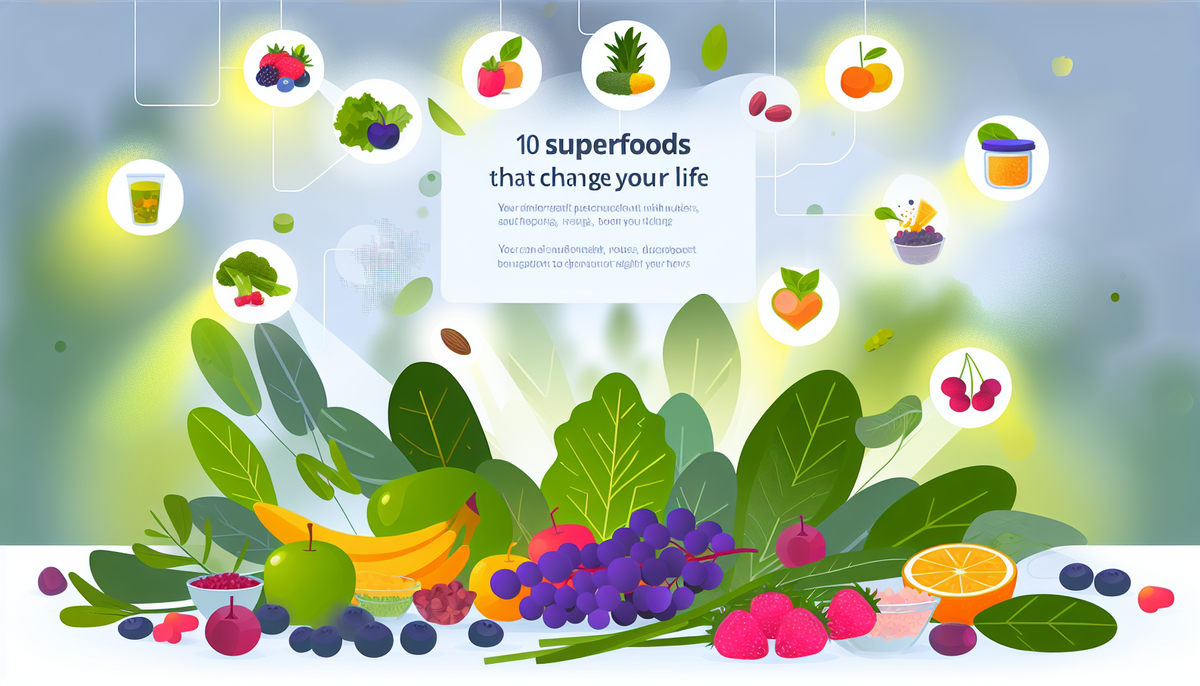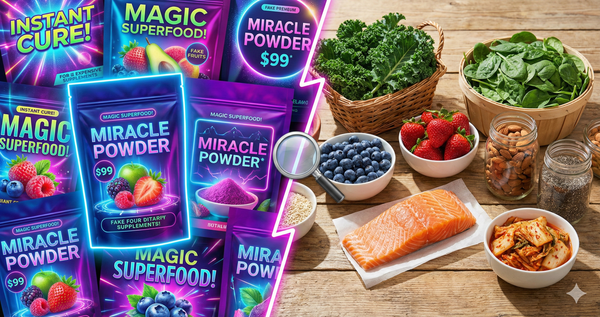10 Superfoods That Can Change Your Life

In today's fast-paced world, maintaining optimal health has become increasingly challenging, yet more important than ever. While processed foods and quick meals dominate modern diets, there's a growing movement toward embracing nutrient-dense superfoods that can dramatically transform your health and well-being. These powerhouse foods aren't just a marketing trend—they're scientifically-backed nutritional champions that deliver exceptional benefits for your body and mind.
Superfoods represent nature's most concentrated sources of vitamins, minerals, antioxidants, and essential compounds that support everything from cardiovascular health to cognitive function. By incorporating these remarkable foods into your daily routine, you can boost your immune system, increase energy levels, improve digestion, and potentially reduce your risk of chronic diseases. The journey to better health doesn't require expensive supplements or complicated meal plans—it starts with understanding which foods pack the most nutritional punch and how to make them a delicious part of your everyday meals.
What Are Superfoods?
The term "superfood" has become ubiquitous in health and wellness circles, but what exactly qualifies a food for this prestigious designation? While there's no official scientific definition, superfoods are generally recognized as nutrient-dense whole foods that provide exceptional health benefits relative to their caloric content. These foods stand out from ordinary options because they contain unusually high concentrations of vitamins, minerals, antioxidants, healthy fats, fiber, or other beneficial compounds that support optimal bodily function.
What makes superfoods truly special is their ability to deliver multiple health benefits simultaneously. Unlike processed foods that might provide calories without substantial nutrition, superfoods offer what nutritionists call "nutritional bang for your buck." They're typically whole, unprocessed foods that have been consumed by various cultures for centuries, often revered for their medicinal properties long before modern science confirmed their benefits.
Definition and Nutritional Value
Superfoods are characterized by their exceptional nutrient density, meaning they contain significantly more vitamins, minerals, and beneficial compounds per serving compared to average foods. These nutritional powerhouses typically score high on measures like the Oxygen Radical Absorbance Capacity (ORAC), which measures antioxidant activity, or the Aggregate Nutrient Density Index (ANDI), which evaluates overall nutritional quality.
The nutritional value of superfoods often stems from their rich antioxidant content, which helps combat oxidative stress and inflammation in the body. Many superfoods contain polyphenols, flavonoids, anthocyanins, and other phytochemicals that give them their vibrant colors and protective properties. These compounds work synergistically to support cellular health, boost immune function, and may help prevent age-related diseases.
Beyond antioxidants, superfoods frequently provide essential fatty acids like omega-3s, complete proteins containing all essential amino acids, complex carbohydrates for sustained energy, and various vitamins and minerals that are often lacking in modern diets. The bioavailability of these nutrients—how easily your body can absorb and use them—is typically higher in superfoods compared to synthetic supplements.
Types of Superfoods
Superfoods span virtually every food category, offering options for every dietary preference and lifestyle. Plant-based superfoods dominate the category and include vibrant berries loaded with antioxidants, leafy greens packed with vitamins and minerals, nuts and seeds rich in healthy fats and protein, and exotic fruits from around the world that have been treasured by indigenous cultures for generations.
Animal-derived superfoods also play important roles in optimal nutrition, particularly for those following omnivorous diets. Fatty fish like salmon and sardines provide essential omega-3 fatty acids, while fermented dairy products like kefir and Greek yogurt offer probiotics for digestive health. Organ meats, though less popular in Western cultures, are among the most nutrient-dense foods available, providing concentrated sources of vitamins A, B12, iron, and other essential nutrients.
Many superfoods are also categorized as "functional foods," meaning they provide health benefits beyond basic nutrition. These include fermented foods that support gut health, adaptogenic herbs that help manage stress, and foods with natural anti-inflammatory properties that may help prevent chronic diseases.
Top 10 Superfoods for a Healthier Life
While hundreds of foods could qualify as superfoods, certain varieties consistently rank among the most beneficial for human health. These top-tier superfoods have been extensively researched and proven to deliver remarkable health benefits when consumed regularly as part of a balanced diet. Each offers unique nutritional profiles and health-promoting compounds that can address different aspects of wellness.
The following superfoods represent the cream of the crop in terms of nutritional density, accessibility, versatility, and scientific backing. From antioxidant-rich berries to omega-3 packed fish, these foods can form the foundation of a health-optimizing diet that supports longevity, energy, and disease prevention.
Fruits and Berries
Blueberries stand out as perhaps the most well-researched superfruit, earning their reputation through numerous studies demonstrating their cognitive and cardiovascular benefits. These small but mighty berries contain exceptionally high levels of anthocyanins, the compounds responsible for their deep blue color and many of their health benefits. Regular blueberry consumption has been linked to improved memory, enhanced brain function, reduced inflammation, and better heart health.
The antioxidant capacity of blueberries is among the highest of all commonly consumed fruits, helping protect cells from damage caused by free radicals. Studies suggest that eating blueberries regularly may help delay age-related cognitive decline and reduce the risk of neurodegenerative diseases. The fiber content in blueberries also supports digestive health and helps regulate blood sugar levels.
Açaí berries, while less familiar to many Western consumers, have been a dietary staple in the Amazon rainforest for centuries. These dark purple berries contain even higher antioxidant levels than blueberries, along with healthy monounsaturated fats, fiber, and various vitamins and minerals. Açaí berries are particularly rich in anthocyanins and may support heart health, skin health, and weight management when combined with a healthy lifestyle.
Other notable superfruit options include goji berries, which provide immune-supporting vitamin C and unique antioxidants; pomegranates, rich in punicalagins that support heart health; and avocados, technically a fruit, which provide healthy monounsaturated fats and fiber that support cardiovascular health and nutrient absorption.
Leafy Greens and Vegetables
Kale has earned its reputation as the king of leafy greens through its impressive nutritional profile that includes vitamins A, C, and K, along with folate, iron, calcium, and powerful antioxidants like lutein and zeaxanthin. One cup of raw kale provides more than 100% of the daily recommended intake of vitamins A, C, and K, making it one of the most nutrient-dense foods available.
The antioxidants in kale, particularly lutein and zeaxanthin, are crucial for eye health and may help prevent age-related macular degeneration. Kale also contains glucosinolates, sulfur-containing compounds that have been studied for their potential cancer-fighting properties. The high fiber content supports digestive health and helps maintain stable blood sugar levels.
Spinach offers similar nutritional benefits with a milder flavor that appeals to those who find kale too bitter. It's particularly rich in folate, which is essential for DNA synthesis and red blood cell formation, making it especially important for pregnant women. Spinach also provides nitrates that may support cardiovascular health and athletic performance.
Other vegetable superfoods include broccoli, which contains sulforaphane and other compounds that support detoxification and may have anti-cancer properties; sweet potatoes, rich in beta-carotene and fiber; and Brussels sprouts, packed with vitamin K and glucosinolates that support liver detoxification.
Nuts and Seeds
Almonds represent one of the most nutritionally complete nuts, providing healthy monounsaturated fats, plant-based protein, fiber, vitamin E, magnesium, and other essential nutrients. The combination of protein, healthy fats, and fiber in almonds makes them excellent for blood sugar control and satiety, helping to prevent overeating and supporting weight management goals.
The vitamin E content in almonds acts as a powerful antioxidant, protecting cell membranes from oxidative damage. Regular almond consumption has been associate




